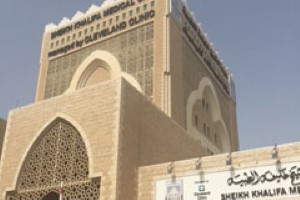ACGME-I Accreditation Stories
Core Faculty, General Surgery Program, Hamad Medical Corporation, Doha Qatar
DIO, Assistant Dean for GME, American University of Beirut, Lebanon
Program Director, Family Medicine Program, Singapore Health Services

When the Oman Medical Specialty Board (OMSB) sought to further enhance the quality of its education and training programs in Oman via authoritative international benchmarking, OMSB decided ACGME-I accreditation would best attain the goal.
OMSB leaders have long recognized how such accreditation would support the institution’s mission “to set high standards for post-graduate medical education of healthcare professionals” and continuously improve those standards.
His Excellency Dr. Abdullah Al Futaisi, OMSB Executive Director and CEO, and Professor Neela Al Lamki, OMSB Designated Institutional Official (DIO) for seeking accreditation, had attended several ACGME conferences over the years. In addition, Prof. Lamki worked at Baylor College of Medicine in Houston, Texas, for more than 20 years, including 11 years as program director for radiology, and is quite familiar with the ACGME organization.
When ACGME-I launched, OMSB immediately began pursuit of accreditation.
“ACGME-I accreditation delivers a strong message that the post-graduate medical education and training at OMSB meets the highest of international standards,” said Dr. Futaisi and Prof. Lamki. “It ensures residents that their education is of outstanding academic quality and professional relevance, and conveys to the public OMSB’s commitment to continuous improvement to its programs that leads to better healthcare in Oman.”
The agreement between OMSB and the ACGME-I commenced in September 2014 and, whereas the prestigious recognition is relatively new, Prof. Lamki anticipates immediate and significant benefits for residents.
“It will be easier for our residents to get hands-on training in the United States through electives, residency training opportunities and fellowships once we get ACGME-I accreditation,” she said. “They may also be able to sit for the American Board of Medical Specialties International certification examination, when available.”
“The ACGME-I accreditation has generated even more interest from our trainers in faculty development workshops and similar programs.”
OMSB considers the accreditation process so valuable that the institution has had its own accreditation program for several years. A committee reviews training programs on a regular basis to assess their adherence to OMBS quality standards for residency training programs, granting accreditation status and citations.
“With ACGME-I accreditation, and combined with our own accreditation process, OMSB programs and resident outcomes will be comparable to similar, optimum programs around the world,” said H.E. Dr. Futaisi and Prof. Lamki.

Attaining a much sought-after ACGME-I accreditation for the Graduate Medical Education Program at the American University of Beirut (AUB) required much patience and literally involved traveling half way across the world.
However, the yeoman efforts by the school’s staff and the flexibility afforded by the ACGME-I helped the institution achieve its goal when accreditation was issued in 2014.
“For nearly 150 years, the AUB School of Medicine has been known as the leading center for medical education in the Middle East, and its Graduate Medical Education long dedicated to training medical graduates in high-quality and cost-effective patient care,” said Salah Zeineldine, MD, FACP, assistant dean for Graduate Medical Education.
“ACGME-I accreditation significantly exhibits how we meet this mission and adhere to the highest of standards to educate and help residents and interns attain optimum performance in their chosen fields,” Dr. Zeineldine added.
The journey to accreditation began a decade ago, and Dr. Zeineldine himself was one of the catalysts. After first attending AUB, he completed in 2004 his education in pulmonary and critical care at Boston’s St. Elizabeth’s Medical Center, which was ACGME-accredited.
Dr. Zeineldine felt so strongly about the value of ACGME accreditation in advancing the quality of resident physicians’ education that he assisted AUB to apply for this prestigious recognition upon his return to Beirut in 2005.Yet, because AUB is not located in a U.S. territory and ACGME had not yet established an international arm, the Graduate Medical Education Program could not be accredited.
Dr. Zeineldine and AUB leadership would not give up the quest. He maintained contact with ACGME and upon learning it planned to launch an international division, closely monitored its establishment. When ACGME-I was formally established, AUB immediately began the application process.
Then, AUB faced another challenge. Due to security concerns, ACGME-I was not able to conduct the important site visit in Beirut, thereby jeopardizing the accreditation. The AUB team was undeterred. It creatively proposed a two-step process to provide the needed personal interaction.
First, a teleconference took place that featured AUB executives and faculty interfacing with ACGME-I to review AUB’s application, procedures and protocols. Then, the AUB team traveled to ACGME-I headquarters in Chicago to present its case face-to-face.
Soon thereafter, AUB Faculty of Medicine and Dr. Zeineldine’s dream was realized – accreditation was issued in July 2014.
“The benefits of ACGME-I accreditation are multi-faceted,” said Dr. Zeineldine. “For faculty, it demands attention to detail and provides more critical structure to the education process. Accreditation underscores to students how AUB is a desired institution where they can receive the best education and training.”
“In addition, accreditation plays an important role in the retention of our residents, who greatly recognize its value. They look forward to the accreditation of specific residency programs.”
In fact, that process already is underway. Five specialty programs now are applying for accreditation, including emergency medicine, family medicine, internal medicine, obstetrics and gynecology, and surgery.

SEHA is a phonetic transcription of the Arabic word for health, and excellent health can be attained by delivering optimum care to the public.
That’s why the Abu Dhabi-based Sheikh Khalifa Medical Center (SKMC), the flagship institution for the SEHA system of hospitals and clinics across the United Arab Emirates, sought to ensure that its education programs for residents and interns at the teaching hospital meets the highest of standards.
After an intensified search for an international accreditation body, SKMC selected ACGME-I to conduct a rigorous, comprehensive, and collaborative review process.
“We always knew we had great programs of internship and residency at our institution,” said Dr. Maha Al Fahim, chair of Education, DIO, and program director of the family medicine residency at SKMC. “However, we lacked the structure and methodology to measure our successes and the contributions of our faculty.
“As the accreditation process unfolded, a wave of excitement developed across the institution as program directors, faculty, coordinators, and residents became invested in developing charts, lists, project records, and other information to make sure we met the accreditation requirements,” said Dr. Al Fahim. “And the support from higher administration was unwavering.”
Dr. Al Fahim lauded the ACGME-I staff for thoroughly interpreting standards and assisting with the accreditation steps. “The process immediately enhanced the structure of the training programs and improved effectiveness of the faculty,” she said.
SKMC received its ACGME-I accreditation in September 2012, and the designation now plays a major role for the institution in accomplishing its mission of delivering services of the highest medical quality at levels comparable to the finest health care systems in the world, according to Dr. Al Fahim.
“Health care regulation and clinical governance require most – if not all – of the clinical services to develop training programs and gain accreditation after it is demonstrated that standardized training goes hand-in-hand with standardized clinical practice and patient care,” she explained. “With ACGME-I accreditation, patients can be totally confident they receive thorough and comprehensive care at our teaching hospital.”
Such accreditation offers benefits to the educators, as well. Dr. Al Fahim noted the endorsement assures an effective learning environment, using proven international standards, is in place for residents.
“And, for me as an educator, accreditation means that my skills will continue to improve and the resources required for the success of the program will be provided by the institution,” she added.
“ACGME-I accreditation may appear at first to be quite a challenging undertaking,” Dr. Al Fahim said. “However, the smooth process and, most critically, the outcomes, quickly make this an extremely worthy investment.”
